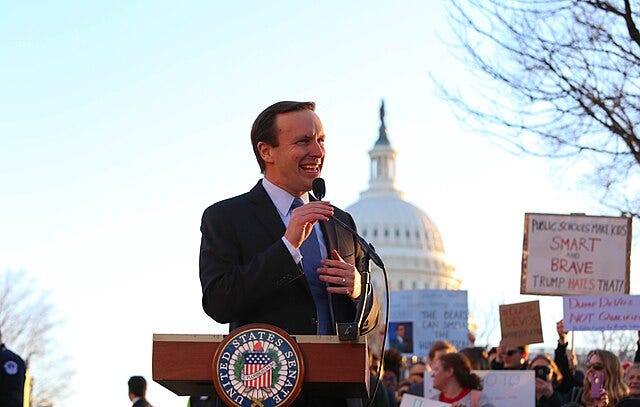Who comes after Schumer?
The Senate Democratic Leader deserves an early retirement
EDINBURGH (U.K.): The past three months have brought a hurricane throughout America which will likely remain in place for the next four years. President Trump and Elon Musk are actively engaging in a fearmongering campaign to terrify federal workers and the American public in the hopes they will submit to their erosion of democracy. This has already alienated European allies which the U.S. was previously loyal to. Mass protests have taken place in every major U.S. city in opposition to the Trump administration’s harassment of federal workers. And yet, in the walls of the Senate, it appears to calls of the public are not loud enough.
Despite the low approval ratings of Republicans, the Democratic Party is at their lowest approval rating in decades. Despite the intensity of the fearmongering campaign, the Democrats have been at war with themselves while the Republicans wage war against American democracy. Americans have derided the Democrats for engaging in no perceived action to counter the onslaught of destructive executive orders from Trump. For a party that campaigned in 2024 that the election of Trump would bring about the end of democratic institutions in America, their business-as-usual approach in 2025 has generated fury from their electorate. Recently, Democratic Senate Leader Chuck Schumer has made himself the biggest target of Democratic discontent.
After initially announcing he and other Democrats would vote to block a spending bill in the Senate, which would have forced a government shutdown, Schumer caved last minute and announced his support of the measure. While the Democrats lack a majority in the Senate, 60 Senators are required to vote in favour of a funding bill. Schumer’s support of providing further funding to the Trump administration was criticised across the board; by progressives such as Congressman Alexandria Ocasio-Cortez and traditionalist Nancy Pelosi. Schumer’s actions to enable the Trump administration were not only a gross political calculation, it was a cowardly betrayal of the country in opposing Trump’s authoritarian takeover. Despite his insistence otherwise, a new leader is needed for Senate Democrats.
The Democrats have long struggled to introduce new leaders to the party. The Senate is no different, as the gerontocracy clings to power at the expense of new faces with brighter ideas. It is clear that if the Democrats want to resist Trump, they will need leaders more in touch with public outage in order to be successful. If there is a leadership change, here’s who could end up succeeding Schumer:
Cory Booker (New Jersey)

A recent Democratic dynamo, Booker received praise for his record-breaking 25-hour marathon speech opposing the Trump administration. Compared to Schumer’s insistence on TV, Booker is a social media magnate with in more in-touch online presence than the current leader. While the Senate leader is nowhere near as strong of a presence as the president, Booker can potentially bring a much-needed face to the Democrat’s opposition since their historic loss in 2024. However, Booker’s personability may be better served for another high office.
Booker himself had notoriety from his presidential campaign in 2020. The steam he’s received from the marathon speech has raised questions about his viability for a 2028 campaign. The symbolism of Booker toppling the record set by an avowed segregationist for the longest speech in the Senate may be an asset if he were to consider running for president in 2028.
Amy Klobuchar (Minnesota)

The No. 3 Democrat in the line of leadership, Klobuchar lacks the pathos of Booker but brings more experience to the table. Of the modern liberal variety, Klobuchar has cultivated a legacy as one of the most effective legislators in Congress. In 2016, she passed more laws than any other members of Congress and has chaired the Democratic Steering Committee since 2015, communicating directly with local activists across the U.S.
Her legislative effectiveness and leadership experiences are two qualities that would be huge assets to her if she were to challenge Trump from the Senate leadership. Her proactive legislating and leadership positions within the party have certainly given her one of the best resumes of anyone on this list.
Chris Murphy (Connecticut)

A favourite of progressives, Murphy has been one of the most vocal opponents of Donald Trump. One of the more compelling political journeys, Murphy’s tenure in the Senate has been defined by the horrific 2012 Sandy Hook massacre that 20 school children under six years old and six staff members. Engaging in a 16-hour filibuster in favour of gun control in 2016, Murphy has been a loud and effective voice in holding the Democrats to their commitments against the American gun epidemic.
Murphy has recently been seen as one of the most prominent opponents to the Trump administration and critics of Democratic indifference. The 51-year-old from Connecticut, like Booker, has cultivated a strong social media presence for his speeches in opposition.
Brian Schatz (Hawaii)

The Deputy Whip of the Democrats is one of the comparably one of the younger leaders in the Democratic Senate. The 52-year-old of the Aloha State has historically been one of the more popular members of the Senate. A low-profile progressive, Schatz has been credited as influential behind the scenes for promoting more progressive policies among his colleagues. Bringing a diverse focus to Congress, Schatz has promoted telehealth, paid family leave for federal workers, and raised the smoking age to 21. Schatz’s cautious progressivism and creative policymaking can provide a fresh line of direction to counter the Trump administration’s policies.
However, Schatz voted for the budget bill that averted the government shutdown. Depending on whether Schumer is forced to step down because of his support, that vote may also prove fatal to any high aspirations Schatz has in the chamber.
Chris Van Hollen (Maryland)

While less known nationally, Van Hollen has been one of the leading critics of Israel’s genocide against Palestine. Criticising both the Biden and Trump administrations on their support of Israel restricting humanitarian aid into Gaza, Van Hollen’s consistent opposition on this issue is fairly unique from even progressive Senators. While the Marylander may struggle to relate this issue to the pro-Israeli lobby that several Democratic Senators are behold to, the increasingly critical views Americans have of Israel’s genocide in Gaza may see Van Hollen’s name receive elevation.
Sheldon Whitehouse (Rhode Island)
A climate hawk, the Rhode Island Senator has been one of the leading activists to address environmental issues facing the U.S. Whitehouse, Chair of the Budget Committee, has spoken about Climate Change in the Senate every week since 2012, celebrating his 250th speech in 2019. A reformer, Whitehouse has called for greater restrictions on the power of Senate Party leaders from serving both as committee chairs in internal party positions. Previously considered a potential Supreme Court nominee by Barack Obama after the vacated seat of Justice Antonin Scalia, Whitehouse is certainly respected enough by his colleagues to reach higher office.
However, Whitehouse has received frequent criticism for insider trading and violating the STOCK Act. While one of many members of Congress to engage in insider trading, it certainly would not help Congress’ dismal approval if the majority leader would receive a mandate with such behaviour.
Secessionist Crisis
The Senate has an internal democracy, so the next leader of the Democrats will not be decided by the public but by the Senators themselves. The upper chamber is increasingly distant and unrepresentative of the wider American population and it is no guarantee that the next Democratic leader will change that trajectory. However, it is clear that the Democratic opposition to the Trump administration is in dire need of fresh faces and must move on from their internal divisions and mount collective opposition. The silence many Democratic Senators have expressed towards Schumer is almost a confirmation that the upper chamber may require more than a fresh new face to provide a much-needed check on executive power.



